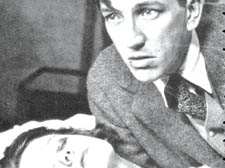|
|
 |
| |

Noel Coward with Edna Best in the 1926 production of The Constant Nymph |
The blood and guts of Coward
Noel Coward overcame artistic resistance, financial problems and a heavily bleeding wrist before
The Vortex reached the stage at the Everyman, writes Gerald Isaaman
NOEL Coward was just an ambitious – and talented – nobody when he dumped two of his plays on the desk of Norman MacDermott, the radical director of the dusty Everyman Theatre in Hampstead.
This was the tiny suburban theatre where plays, possibly en route to the West End, were tried out, some major works by Bernard Shaw, John Galsworthy, Eugene O’Neill and Arnold Bennett with such stars of the future as Edith Evans, Sybil Thorndike, Claude Rains and Raymond Massey making their initial mark.
The year was 1924 and Coward’s plays were Hay Fever and The Vortex, the latter now being given a West End revival with Felicity Kendal in the starring role of an egotistic, upper-crust lady and her son dabbling with drugs.
Indeed, Coward’s daring social comedy, now described as the “the vortex of beastliness”, was the first play ever to tackle the subject of sex and drugs. It was his breakthrough triumph as a playwright, producer and performer, earning him just £5 a week at the Everyman, the wage all the cast received under MacDermott’s financial restrictions.
The memoirs of MacDermott and Coward, then 24, differ on the details, but MacDermott insisted that The Vortex, which he believed would be a “sure-fire success”, came first – Coward not signing the contract until rehearsals were already under way.
“The theatre itself was small, intimate and draughty,” Coward later recalled. “Its auditorium, foyer and corridors were carpeted austerely with coconut matting, and there was a subtle but determined aroma of artistic endeavour pervading the whole place.”
Then MacDermott suddenly announced he didn’t have the money to back the play and declared it would have to be abandoned unless Coward could raise £200.
“This was the first of many horrible setbacks attending that production,” admitted Coward. “I was in despair, and spent a black 24 hours racking my brains to think of someone whom I could ask for the money.”
He hit on Michael Arlen – whose novel The Green Hat had become a bestseller – took him to dinner and blurted out his troubles. Arlen signed a cheque on the spot and The Vortex took a leap forward, only to be thwarted when one of the cast developed diphtheria and had to be replaced.
Then came another unexpected obstacle. Coward’s leading lady, Kate Cutler, had a screaming row with Coward because he had rewritten the second act of The Vortex to improve the play, giving himself a bigger role than he had before. And Kate insisted he had done it deliberately to humiliate her.
Either they would revert to the original script or she would depart was Kate’s ultimatum.
“After a violent scene in which both Kate and I held our ground sturdily and refused to give way an inch, Kate left the theatre, and there I was, a week away from production, faced with two alternatives,” says Coward in his memoirs.
“I could either stick to my guns, in which case I should have to find a new leading lady immediately and rehearse her from the beginning. Or I could surrender to Kate by reverting to the original last act, which I knew to be too short and lacking the correct emotional balance in the conflict between mother and son.
“When all rage was spent and blood had resumed its normal circulation, I decided, quite firmly and without passion, that neither then nor at any time in my life would I allow myself to be dictated to in the old-age battle between actor and author.”
With his inherent charm, Coward then pulled off a remarkable coup, persuading Lilian Braithwaite to take the role of his neurotic and flamboyant stage mother, despite her being offered a much more lucrative West End role.
MacDermott, who had been away during the hectic weekend of change, was furious at not being consulted, and declared that Braithwaite was utterly wrong for the part.
He washed his hands of the production, Coward coolly pointing out that he had himself funded it anyway.
Alas, that wasn’t the end of it either. Not only was he worried about his own performance but a row followed with MacDermott about the set for the play and then Lord Cromer, the Lord Chancellor who licensed all plays, took exception to some of the outspoken dialogue.
Again, Coward’s charm won him over and, describing opening night, he wrote: “That evening was altogether an extraordinary experience.
“There was a certain feeling of expectancy in the air, an acceptance almost the play would be a success.
“The audience looked distressingly near owing to there being no orchestra pit and no footlights. Familiar faces suddenly jumped out of the darkness and accosted us in the middle of a scene. Lilian was cool and steady and played beautifully. I was all over the place, but gave, on the whole, one of those effective, nerve-strung tour-de-force performances.
“At the end of the play the applause was terrific. I happened to cut a vein in my wrist when, towards the end of the last act, I had to sweep all the cosmetics and bottles off the dressing table. I bound it up with my handkerchief during the curtain calls, but it bled effectively through my author’s speech.
“The first person to clutch my hand afterwards was Michael Arlen. He said, ‘I’d be so proud, so very proud if I had written it’.”
Coward, after two earlier failures, was made when The Vortex swept into the West End. But he never returned to the fateful Everyman to produce his next triumph, Hay Fever, or ever again since the final curtain came down in 1926. |

|
 |
|
 |
|

